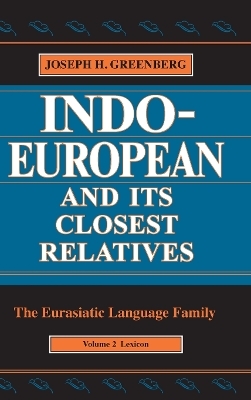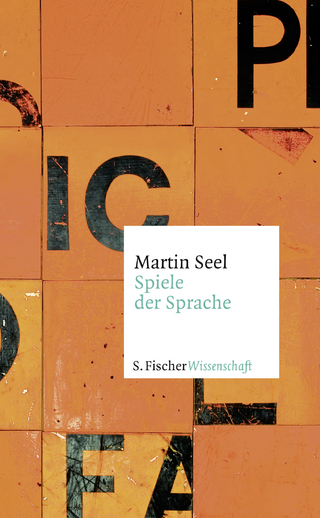
Indo-European and Its Closest Relatives
The Eurasiatic Language Family, Volume 2, Lexicon
Seiten
2002
|
2nd edition
Stanford University Press (Verlag)
978-0-8047-4624-3 (ISBN)
Stanford University Press (Verlag)
978-0-8047-4624-3 (ISBN)
The second volume of Joseph Greenberg's pioneering study of the relationship between Indo-European languages and those of northern Asia and North America.
The basic thesis of this two-volume work (Volume I. Grammar was published in 2000) is that the well known and extensively studied Indo-European family of languages is but a branch of a much larger Eurasiatic family that extends from Europe across northern Asia to North America. Eurasiatic is seen to consist of Indo-European, Uralic-Yukaghir, Altaic (Turkic, Mongolian, and Tungus-Manchu), Japanese-Korean-Ainu (possibly a distinct subgroup of Eurasiatic), Gilyak, Chukotian, and Eskimo-Aleut. The author asserts that the evidence presented in the two volumes for the validity of Eurasiatic as a single linguistic family confirms his hypothesis since the numerous and interlocking resemblances he finds among the various subgroups can only reasonably be explained by descent from a common ancestor.
The present volume provides lexical evidence for the validity of Eurasiatic as a linguistic stock. Since some of the relevant etymological material has already been published in the work of some Nostraticists, this volume emphasizes those etymologies involving Ainu, Gilyak, Chukotian, and Eskimo-Aleut, languages generally omitted from Nostratic studies. The Eurasiatic family is itself most closely related to the Amerind family, with which it shares numerous roots. The Eurasiatic-Amerind family represents a relatively recent expansion (circa 15,000 BP) into territory opened up by the melting of the Arctic ice cap. Eurasiatic-Amerind stands apart from the other families of the Old World, among which the differences are much greater and represent deeper chronological groupings.
The volume includes a classification of Eurasiatic languages, references cited, and semantic and phonetic indexes.
The basic thesis of this two-volume work (Volume I. Grammar was published in 2000) is that the well known and extensively studied Indo-European family of languages is but a branch of a much larger Eurasiatic family that extends from Europe across northern Asia to North America. Eurasiatic is seen to consist of Indo-European, Uralic-Yukaghir, Altaic (Turkic, Mongolian, and Tungus-Manchu), Japanese-Korean-Ainu (possibly a distinct subgroup of Eurasiatic), Gilyak, Chukotian, and Eskimo-Aleut. The author asserts that the evidence presented in the two volumes for the validity of Eurasiatic as a single linguistic family confirms his hypothesis since the numerous and interlocking resemblances he finds among the various subgroups can only reasonably be explained by descent from a common ancestor.
The present volume provides lexical evidence for the validity of Eurasiatic as a linguistic stock. Since some of the relevant etymological material has already been published in the work of some Nostraticists, this volume emphasizes those etymologies involving Ainu, Gilyak, Chukotian, and Eskimo-Aleut, languages generally omitted from Nostratic studies. The Eurasiatic family is itself most closely related to the Amerind family, with which it shares numerous roots. The Eurasiatic-Amerind family represents a relatively recent expansion (circa 15,000 BP) into territory opened up by the melting of the Arctic ice cap. Eurasiatic-Amerind stands apart from the other families of the Old World, among which the differences are much greater and represent deeper chronological groupings.
The volume includes a classification of Eurasiatic languages, references cited, and semantic and phonetic indexes.
The late Joseph H. Greenberg was Professor of Anthropology and Linguistics at Stanford University. Among his many books over a fifty-year career is On Language: Selected Writings of Joseph H. Greenberg (Stanford, 1990)
List of tables and maps 1. The historical background 2. Some aspects of the comparative phonology of eurasiatic 3. Grammatical evidence for eurasiatic Appendix Classification of eurasiatic languages Indexes.
| Zusatzinfo | 2 maps |
|---|---|
| Verlagsort | Palo Alto |
| Sprache | englisch |
| Maße | 152 x 229 mm |
| Gewicht | 458 g |
| Themenwelt | Geisteswissenschaften ► Philosophie ► Sprachphilosophie |
| ISBN-10 | 0-8047-4624-9 / 0804746249 |
| ISBN-13 | 978-0-8047-4624-3 / 9780804746243 |
| Zustand | Neuware |
| Haben Sie eine Frage zum Produkt? |
Mehr entdecken
aus dem Bereich
aus dem Bereich
Macht und Legitimität politischer Sprache im Prozess der europäischen …
Buch | Softcover (2023)
Nomos (Verlag)
74,00 €
Wie die Menschheit zu ihrer größten Erfindung kam
Buch | Softcover (2022)
C.H.Beck (Verlag)
18,00 €


